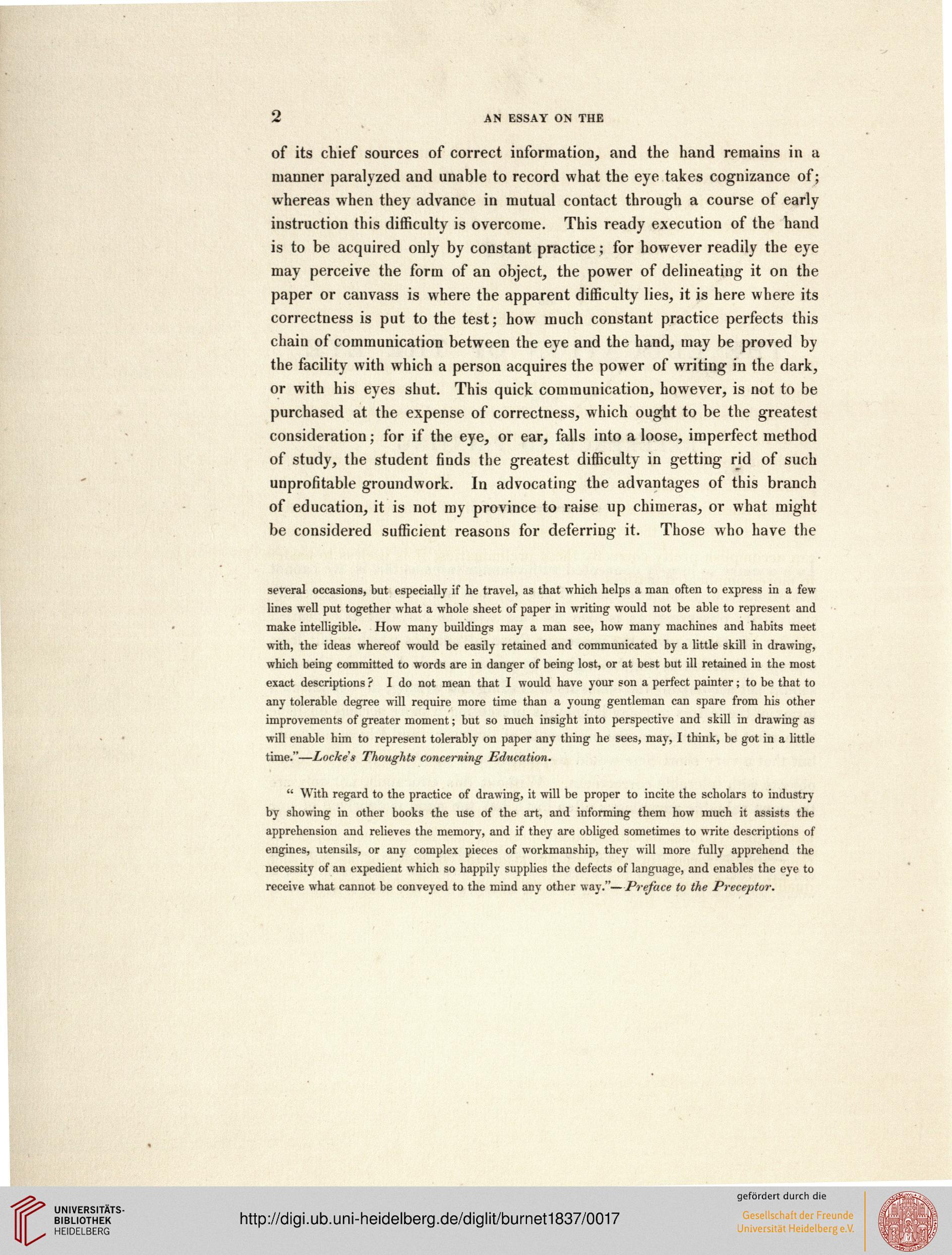Z AN ESSAY ON THE
of its chief sources of correct information, and the hand remains in a
manner paralyzed and unable to record what the eye takes cognizance of;
whereas when they advance in mutual contact through a course of early
instruction this difficulty is overcome. This ready execution of the hand
is to be acquired only by constant practice; for however readily the eye
may perceive the form of an object, the power of delineating it on the
paper or canvass is where the apparent difficulty lies, it is here where its
correctness is put to the test; how much constant practice perfects this
chain of communication between the eye and the hand, may be proved by
the facility with which a person acquires the power of writing in the dark,
or with his eyes shut. This quick communication, however, is not to be
purchased at the expense of correctness, which ought to be the greatest
consideration; for if the eye, or ear, falls into a loose, imperfect method
of study, the student finds the greatest difficulty in getting rid of such
unprofitable groundwork. In advocating the advantages of this branch
of education, it is not my province to raise up chimeras, or what might
be considered sufficient reasons for deferring it. Those who have the
several occasions, but especially if he travel, as that which helps a man often to express in a few
lines well put together what a whole sheet of paper in writing would not be able to represent and
make intelligible. How many buildings may a man see, how many machines and habits meet
with, the ideas whereof would be easily retained and communicated by a little skill in drawing,
which being committed to words are in danger of being lost, or at best but ill retained in the most
exact descriptions ? I do not mean that I would have your son a perfect painter; to be that to
any tolerable degree will require more time than a young gentleman can spare from his other
improvements of greater moment; but so much insight into perspective and skill in drawing as
will enable him to represent tolerably on paper any thing he sees, may, I think, be got in a little
time."—Locke's Thoughts concerning Education.
" With regard to the practice of drawing, it will be proper to incite the scholars to industry
by showing in other books the use of the art, and informing them how much it assists the
apprehension and relieves the memory, and if they are obliged sometimes to write descriptions of
engines, utensils, or any complex pieces of workmanship, they will more fully apprehend the
necessity of an expedient which so happily supplies the defects of language, and enables the eye to
receive what cannot be conveyed to the mind any other way."—Preface to the Preceptor.
of its chief sources of correct information, and the hand remains in a
manner paralyzed and unable to record what the eye takes cognizance of;
whereas when they advance in mutual contact through a course of early
instruction this difficulty is overcome. This ready execution of the hand
is to be acquired only by constant practice; for however readily the eye
may perceive the form of an object, the power of delineating it on the
paper or canvass is where the apparent difficulty lies, it is here where its
correctness is put to the test; how much constant practice perfects this
chain of communication between the eye and the hand, may be proved by
the facility with which a person acquires the power of writing in the dark,
or with his eyes shut. This quick communication, however, is not to be
purchased at the expense of correctness, which ought to be the greatest
consideration; for if the eye, or ear, falls into a loose, imperfect method
of study, the student finds the greatest difficulty in getting rid of such
unprofitable groundwork. In advocating the advantages of this branch
of education, it is not my province to raise up chimeras, or what might
be considered sufficient reasons for deferring it. Those who have the
several occasions, but especially if he travel, as that which helps a man often to express in a few
lines well put together what a whole sheet of paper in writing would not be able to represent and
make intelligible. How many buildings may a man see, how many machines and habits meet
with, the ideas whereof would be easily retained and communicated by a little skill in drawing,
which being committed to words are in danger of being lost, or at best but ill retained in the most
exact descriptions ? I do not mean that I would have your son a perfect painter; to be that to
any tolerable degree will require more time than a young gentleman can spare from his other
improvements of greater moment; but so much insight into perspective and skill in drawing as
will enable him to represent tolerably on paper any thing he sees, may, I think, be got in a little
time."—Locke's Thoughts concerning Education.
" With regard to the practice of drawing, it will be proper to incite the scholars to industry
by showing in other books the use of the art, and informing them how much it assists the
apprehension and relieves the memory, and if they are obliged sometimes to write descriptions of
engines, utensils, or any complex pieces of workmanship, they will more fully apprehend the
necessity of an expedient which so happily supplies the defects of language, and enables the eye to
receive what cannot be conveyed to the mind any other way."—Preface to the Preceptor.





